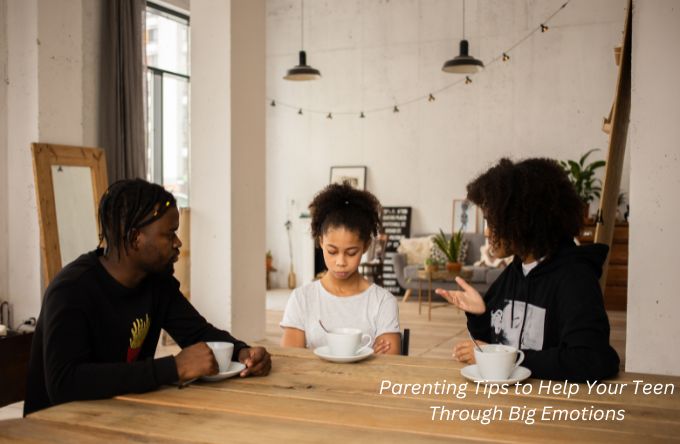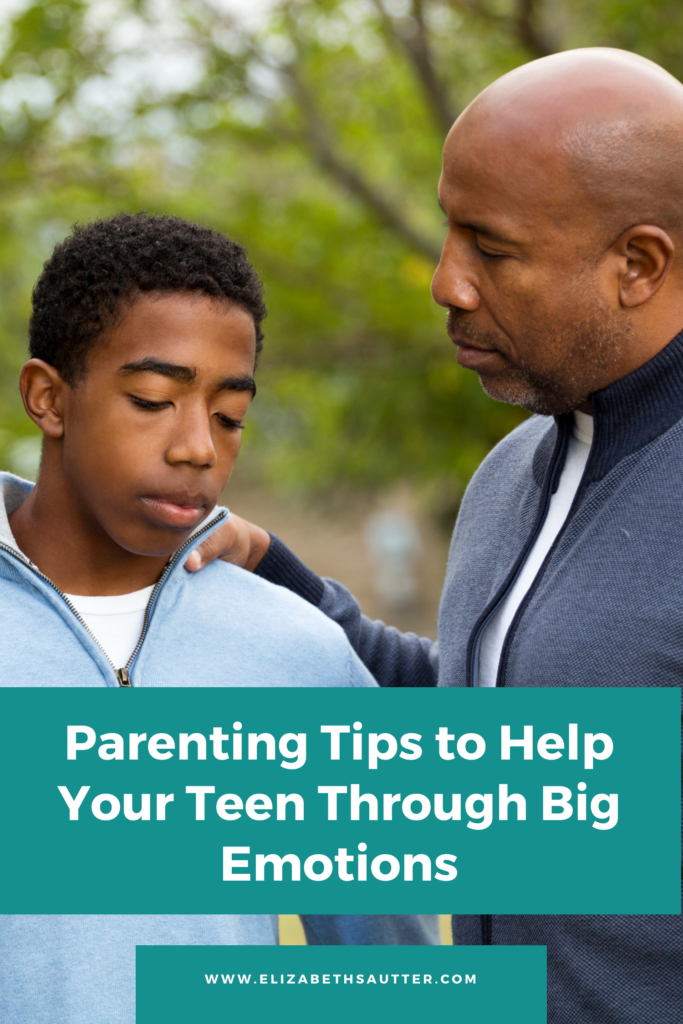If you’re navigating the emotional ups and downs of raising a teen, you’re not alone. Trust me, as a mom of two teen boys both navigating ADHD, anxiety, and the whirlwind of adolescence I can tell you firsthand that this phase is as much a rollercoaster for us parents as it is for them.
One moment your teen is cracking jokes at the dinner table; the next, they’re shutting their bedroom door in tears over something seemingly minor. It’s tough not to feel helpless when your usual strategies for soothing them seem to fall flat. I’ve been there, countless times, sitting outside their doors wondering, How can I help without pushing them further away?

Here’s the thing: those big emotions while overwhelming are perfectly normal and even necessary for their growth.
What I’ve learned through my journey as both a parent and a therapist is that these emotional waves don’t have to swamp us. With a few intentional shifts, we can help our teens ride out their feelings while strengthening our connection to them.
Understanding Big Emotions in Teens
Key Parenting Tips for Handling Big Emotions
Here are essential parenting tips to support your teen through intense emotions:
1. Be a Calm Anchor
2. Listen and Validate Their Feelings
One of the best ways to connect with your teen is to actively listen to them. When they’re emotional, try to refrain from interrupting or immediately offering solutions. Let them express themselves and take a moment to really hear what they’re saying. By doing this, you convey that their feelings are important and that they’re being understood.
Use validation phrases like:
– “I can see that you’re really upset. I’d feel the same way in your situation.”
– “It sounds like you’re frustrated about what happened at school.”
This shows empathy and encourages them to share openly without fear of judgment or dismissal.
3. Normalize Their Emotions
Teens often don’t know what they’re feeling. Emotions can be confusing and, at times, overwhelming. A great parenting tip is to help them identify and label what they’re experiencing. Are they feeling sad, anxious, or maybe angry? Giving names to their emotions can make these feelings feel less intimidating and more manageable.
Avoid over-labeling or diagnosing emotions. Everyday feelings don’t need to be pathologized. For instance, sadness doesn’t always mean depression, and being nervous doesn’t always imply anxiety. Simply normalizing these emotions as part of the human experience helps your teen realize that their feelings are not only valid but also temporary.
4. Set Boundaries with Connection and Calm
Empathy doesn’t mean saying “yes” to everything. Boundaries are a way to provide security and guidance for your teen, even in emotionally charged moments. For example, if your teen is upset and their words or tone become harsh, you can acknowledge their feelings while gently steering them toward a more constructive way to express themselves. Try something like:
“I can tell you’re really frustrated, and it’s okay to feel that way. I want to hear what’s on your mind, but the way you’re talking right now is making it hard for me to listen. Let’s take a few minutes to cool down and then try again.”
This approach not only validates their feelings but also models how to navigate tough emotions in a healthy way. Boundaries like these create opportunities for connection and teach your teen how to express themselves effectively, even during intense moments.
5. Allow Them Space When Needed
The Benefits of Helping Your Teen Process Emotions
Guiding your teen through big emotions teaches them that feelings aren’t something to be feared or suppressed. Instead, emotions are a normal part of life that can be managed with self-awareness and healthy expression. Over time, these skills contribute to better mental health and emotional resilience.
Teens who learn to handle their emotions grow into adults who are comfortable with their feelings and know how to navigate them constructively. They’re better prepared for life’s challenges, armed with the ability to process and communicate effectively.
Ready for Personalized Support?
Mom to two neurodivergent teens and a therapist, I’ve been there—and I know how hard it can be when the usual parenting strategies just don’t seem to work. That’s why I’m passionate about sharing practical tools, resources, and support that make a real difference.
By implementing these tips, you’re not just managing emotional moments—you’re empowering your teen to grow into a self-aware, emotionally healthy adult. When you approach emotions with patience, empathy, and structure, you teach them that it’s okay to feel deeply while staying in control a lesson they’ll carry for life.
For more strategies, encouragement, and community, check out the resources on my website, ElizabethSautter.com, including workshops, my parenting course, and free downloads. Don’t forget to join my newsletter for regular updates and follow me on social media for tips and inspiration. You don’t have to navigate this journey alone I’m here to help.
More Resources
Stay connected with valuable resources to support your neurodivergent child! Download the Neurodiversity Positive Parent Pack for free—a collection of tools like an intention-setting workbook, affirming definitions, and empowering scripts for meaningful conversations. These resources are designed to foster understanding, confidence, and purpose for your family every day.

